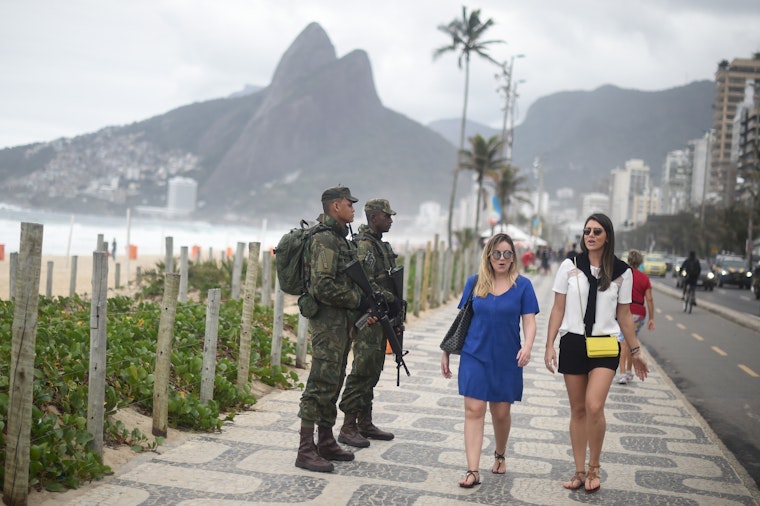Brazil’s Security Plans for the Olympics Raise Eyebrows
By Natalia Viana

The beach at Ipanema, known to the world as the place where a beautiful girl once passed by, today is being patrolled by dozens of armed military police. At Copacabana and Flamengo, two other beaches in Rio de Janeiro, visitors will find a couple of military tanks, as well as a phalanx of Brazilian soldiers standing guard with rifles.
Altogether, a security force of 85,000 has arrived in Rio to keep the peace during the Olympics. But peace is not what this offensive should signify to athletes and spectators coming to Rio this year.
The security measures should give pause to anyone concerned about transparency or basic rights. In June, the federal government of Brazil granted $850 million in funds to the state of Rio de Janeiro, officially doubling expenses for security. The generous donation was granted after the state declared itself “in a state of calamity” and said that it was unable to pay key workers’ salaries. The figure itself is staggering—in comparison, the federal government spent $582 million on the World Cup in 2014, a month-long countrywide event with a dozen host cities.
Some of the funds will be used to pay police salaries from as far back as May. But how the rest will be used remains unclear. “We will send it to each police station and they will then decide how to spend it,” said a spokesperson bluntly.
Agencia Publica, an independent news agency in Brazil, submitted two Freedom of Information Act (FOIA) requests for details about the true figures and how the money will be spent, but did not receive responses, leaving many questions unanswered: How can society monitor the use of these funds if figures are not provided? What is the direct connection between these expenses and the Olympics? And what will be done with any leftover money?
All levels of government have been less than forthcoming about security plans for the games. Of the 16 FOIA requests submitted to various entities—including the Federal Police, the Defense Ministry, the Justice Ministry, Rio’s Court of Justice, and Rio’s Department of Security—only nine responded with satisfactory answers. The transparency group Artigo 19 and the human rights group Justica Global submitted the FOIA requests in February and March, and the responses were analyzed by Agencia Publica.
The state of Rio de Janeiro’s Security Department was the most opaque of all institutions, ignoring some of the requests entirely and not delivering answers within the timeframe required by law. In addition, the department’s “shopping list” of nonlethal weapons to be used by law enforcement officers during the Olympics was only divulged on April 1, after Artigo 19 appealed to the Ministry of Transparency.
The request revealed that the department has bought 18,000 rubber bullets, 4,500 tear gas bombs, and 4,500 stun grenades in anticipation of the Games. This means 1,200 bullets, 300 bombs, and 300 grenades to use every single day during the Olympics.
The Ministry of Defense also confirmed that 18,000 members of the armed forces will be sent to cities where soccer games will be held, namely São Paulo, Manaus, Salvador, Brasília, and Belo Horizonte. An additional 20,000 will be stationed in Rio de Janeiro, including 4,000 marines, 14,000 from the army, and 2,000 from the navy.
A FOIA request about the electronic equipment and software that the police will use was never answered. The Security Department claimed this was strategic and classified information, but didn’t specify why.
According to Camila Marques, legal coordinator for Artigo 19, the implementation of mega-events like the Olympics usually results in a number of human rights violations, including the removal of entire communities, increased militarization, and the criminalization of social movements. The opacity in the responses we have received indicates that the legacy of these Games will be no different.
Brazil’s antiterrorism act, passed by President Dilma Rousseff in March, contains a number of concepts that could be used to criminalize and restrict the actions of social and protest movements. The wording of the law is vague enough that it could be applied to civil disobedience. For instance, activists fear that phone jammers and anti-drone technology could be used against them during the games.
The Joint Staff of the Armed Forces confirmed that drones might be considered “hostile aircraft” if they enter restricted or prohibited areas, including stadiums or the Olympic Park. It was also confirmed that phone jammers could be used against people identified as potential terrorist threats, preventing them from communicating and coordinating their activities. Due to the history of police discrimination and criminalization of black and poor people, and the crackdown on activists during the World Cup, social movement leaders are concerned about the criteria that will be used to decide who, or what, is a “threat to security.”
Public security remains one of the least transparent areas of government. Yet the disclosure of critical information does not heighten security risks in most cases. On the contrary, it promotes debate and research, and tests the effectiveness of these approaches. The government of Brazil should embrace such openness, not just for the sake of transparency, but for public safety as well.
Agencia Publica, Artigo 19, and Justica Global are grantees of the Open Society Foundations.
Natalia Viana is a director at Agencia Publica.